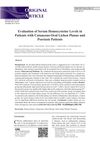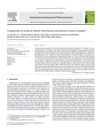December 2023 in “Animals” The research found genes and miRNAs that may control hair growth in Forest Musk Deer.
October 2023 in “Applied sciences” Iris germanica rhizome-derived exosomes help protect skin cells from oxidative stress and aging.
October 2023 in “International journal of molecular sciences” Key proteins and pathways regulate wool fiber diameter in Alpine Merino sheep.
 August 2023 in “Processes”
August 2023 in “Processes” Fermenting Dendrobium officinale with Lactobacillus reuteri CCFM8631 increases its skin care benefits.
 August 2023 in “Scientia Pharmaceutica”
August 2023 in “Scientia Pharmaceutica” Color changes in Minoxidil hair products do not affect their effectiveness.
 June 2023 in “Current Issues in Molecular Biology”
June 2023 in “Current Issues in Molecular Biology” DN106212, an extract from a plant, is better at promoting hair growth than other tested substances by affecting hair growth factors and follicle development.
 June 2023 in “Food frontiers”
June 2023 in “Food frontiers” Ginsenoside CK, found in Panax ginseng, can prevent hair loss by controlling certain growth pathways and promoting hair follicle development.
 May 2023 in “Journal of Ethnopharmacology”
May 2023 in “Journal of Ethnopharmacology” The wild garlic plant, Allium macrostemon Bunge, can promote hair growth and could potentially be used to treat hair loss.
 October 2022 in “Legume Research”
October 2022 in “Legume Research” The research found a way to grow plant tissue and analyze compounds in Bituminaria bituminosa, which is promising for hair restoration treatments.
 April 2022 in “Molecules”
April 2022 in “Molecules” Teak leaf extract contains compounds that could help treat hair loss.
May 2020 in “Authorea (Authorea)” Olfactory receptors found outside the nose may offer new treatments for diseases like cancer and help in wound healing and hair growth.
 May 2020 in “Research, Society and Development”
May 2020 in “Research, Society and Development” Mutamba fruits are rich in soluble solids, vitamin C, and minerals, making them good for food industry use.
 April 2011 in “한국생물공학회 학술대회”
April 2011 in “한국생물공학회 학술대회” Lotion with fucoidan from brown seaweed improved skin and reduced allergy symptoms in mice with dermatitis.
The new minoxidil gel reduces runoff and improves eyebrow hair growth.
October 2022 in “Biomedicines” Finasteride in male rats causes liver and metabolic issues in their offspring.
June 2022 in “Conjunctions” YouTube videos of men using Finasteride and Minoxidil for hair and beard growth form a unique self-tracking genre that helps build community and shape male identity.
 February 2022 in “Scientia Pharmaceutica”
February 2022 in “Scientia Pharmaceutica” Different hair loss treatment ingredients work well with TrichoTech™ vehicles for 3 to 6 months, making them good for use in hair treatments.
January 2022 in “Springer eBooks”  October 2023 in “The Open public health journal”
October 2023 in “The Open public health journal” Alopecia greatly affects Greek women's daily life, relationships, and self-image, with mixed social support and dissatisfaction with treatments.
 47 citations,
January 2019 in “Nature communications”
47 citations,
January 2019 in “Nature communications” Polyamines help fix DNA damage accurately in cells.
 166 citations,
March 2007 in “Hypertension”
166 citations,
March 2007 in “Hypertension” High androgen levels in young women with PCOS are linked to higher blood pressure.
 26 citations,
June 2000 in “Journal of The American Academy of Dermatology”
26 citations,
June 2000 in “Journal of The American Academy of Dermatology” Men with balding at age 45 had higher IGF-1 and lower IGFBP-3, suggesting these factors might be important in male pattern baldness.
 3 citations,
September 2017 in “Galen medical journal”
3 citations,
September 2017 in “Galen medical journal” Patients with psoriasis and cutaneous-oral lichen planus have higher blood homocysteine levels than healthy people.
 3 citations,
June 2000 in “Journal of The American Academy of Dermatology”
3 citations,
June 2000 in “Journal of The American Academy of Dermatology” Men with balding at age 45 had higher IGF-1 and lower IGFBP-3 levels, suggesting these factors might influence male pattern baldness.
 January 2024 in “Journal of Ayurveda Campus”
January 2024 in “Journal of Ayurveda Campus” Psoralea corylifolia Linn. is a medicinal plant used for skin diseases and has various health benefits.
 162 citations,
January 2015 in “Trends in Endocrinology and Metabolism”
162 citations,
January 2015 in “Trends in Endocrinology and Metabolism” Women with PCOS face higher risks of diabetes and heart disease, and these risks increase with obesity.
 71 citations,
June 2006 in “Human Reproduction”
71 citations,
June 2006 in “Human Reproduction” Women with PCOS who have low SHBG are more likely to have low good cholesterol and metabolic syndrome.
 49 citations,
September 2008 in “International journal of pharmaceutics”
49 citations,
September 2008 in “International journal of pharmaceutics” Artificial sebum L closely mimics human sebum for drug delivery research.
 36 citations,
March 2002 in “Journal of Biological Chemistry”
36 citations,
March 2002 in “Journal of Biological Chemistry” Food deprivation increases MST enzyme in the brain, possibly affecting energy balance.
 34 citations,
July 2020 in “Frontiers in immunology”
34 citations,
July 2020 in “Frontiers in immunology” Androgens may influence T cells, contributing to higher autoimmune liver disease risk in women.





















